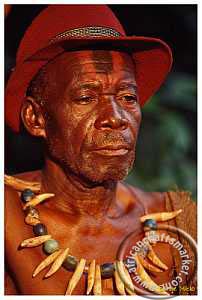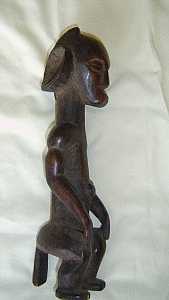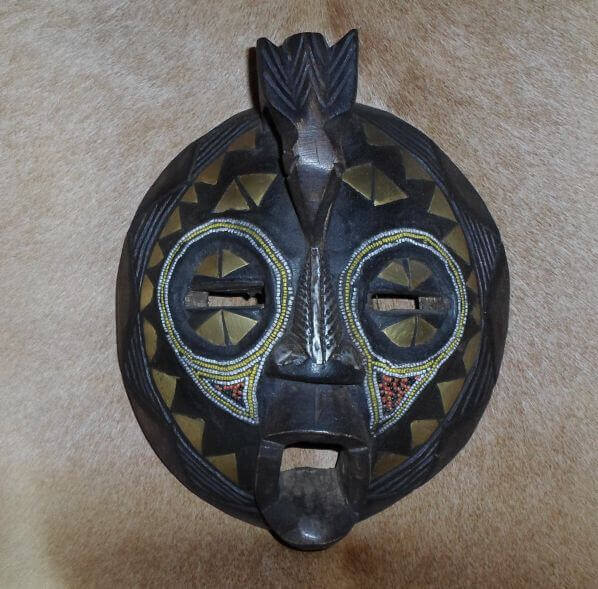Teke People Traditions & Culture

TRIBES PEOPLE GROUPS
Teke people - Kidumu tribe
The Teke tribal people originate from the Ogowe
region in the Democratic Republic of Congo and Gabon. They are part
of the Kidumu tribe who has very strong spiritual
values and the family is the most important social unit of the
tribe. The Teke people usually have one family head that has the
right to life and death over all the family members and is often
called upon as a tribunal chief or mfumu mpugu to decide the fate of a family member
when they have done wrong doings. The tribal
chief has a tendency to own many slaves and controls the
lives of others as he increases his power and status. The name of
the Teke people originates from the occupation of the tribal Teke
people that is, trading from Teke, meaning,
to buy. The economy of the Teke is mainly based on
farming maize, millet and tobacco, but the Teke are also hunters,
skilled fishermen and traders. They believe in a supreme being, the
creator of the universe called Nzambi, whose
favors can be obtained with the help of tutelary spirits


The Teke people are very spiritual and the tribal
chief was chosen as the religious leader. He was highly respected
and never doubted in any decision he made. He was the most
important member of any family and is the person that would contact
the spiritual Gods through potions and bones to speak to the
spirits and rule safety over his people.
The Teke or Kidumu people are well known for their Teke masks,
which are round flat disk like wooden masks that have abstract
patterns and geometric motifs with horizontal lines that are
painted in earthly colors, mainly dark blue, blacks, browns and
clays. The traditional Teke masks all have triangle shaped noses.
The masks have narrow eye slits to enable the masker to see without
being seen. They have holes pierced along the edge for the
attachment of a woven raffia dress with feathers and fibers. The
dress would add to the mask's costume and conceal the wearer These
Teke masks are mainly used in traditional dancing ceremonies such
as wedding, funeral and initiation ceremonies of young men entering
adult hood. These disk shaped masks are used as social and
political identifiers of social structure within a tribe or
family.
Teke artists carve fetish figures. Three elements are
characteristic: a variety of head dresses, the presence of fine
parallel scarification's on the cheeks, and the addition of fetish
materials bonga either in an abdominal cavity or in a
body-enveloping sack from which the head and feet protrude. Each
figure has its own specific purpose not related directly to its
appearance. Figures of identical appearance serve also for success
in hunting, trading, and other activities, each figure's purpose
being known only to the owner. These figures protect and assist the
Teke and, if a fetish figure successfully demonstrates its power,
its owner may detach bonga, break it into several pieces and insert
fragments into other figures.
The French first arrived in the Democratic Republic of Congo in
late 1800. History has shown the French to occupy the Congo in the
1880's. During this period traditional Teke ceremonies were very few,the French
ruled the Congo for 80 years and during this period the Teke people
suffered heavily from colonial exploits with government gathering
land for their own use and ensuing damage to traditional economies
including massive displacement of people.  This cause the local
economy and food reproduction to dwindle and it was only much later
in the 1960's that the Teke people started to gain back
their independence and traditional life started to flourish once
again.
This cause the local
economy and food reproduction to dwindle and it was only much later
in the 1960's that the Teke people started to gain back
their independence and traditional life started to flourish once
again.
Click here Learn about more African tribes and traditions
The Ashanti tribe ~ The Bushman tribe ~The Maasai (Masai) tribe ~The Ndebele tribe ~The Shona tribe ~ The Teke people / Kidumu tribe ~The Zulu tribe
AFRICAN CRAFTS MARKET is a company situated in South Africa that has many Zulu pieces of art available for sale, from the lovely Zulu bead work and grass weave baskets through the traditional Zulu shields. To view the items that may be of interests to you go to our gallery pages on our website at www.africancraftsmarket.com












